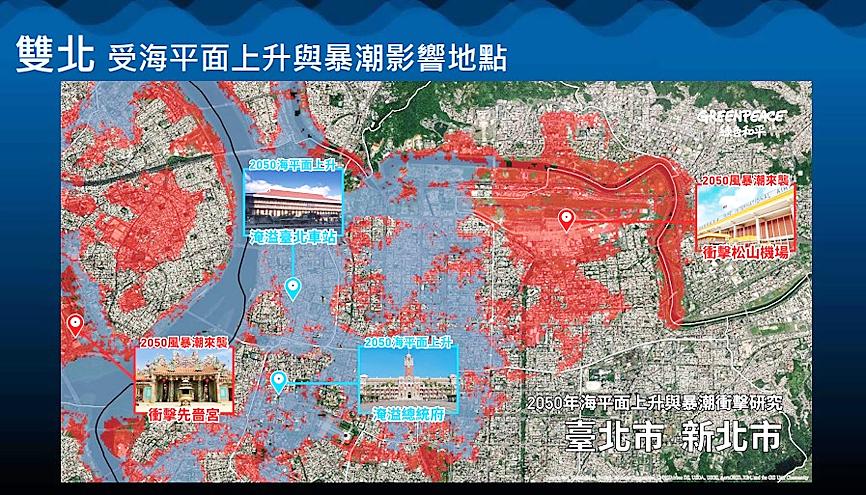If Taiwan fails to curb its carbon dioxide emissions over the next 30 years, rising sea levels and storm surges would pose a threat to millions of residents in the six special municipalities, Greenpeace Taiwan said yesterday as it urged the central and local governments to take action.
The call came as the environmental group released a report on its analysis of the problems that Taiwan could face as the global sea level rises, warning that the seas around Taiwan are rising at twice the global average due to the nation’s location and influence from ocean currents.
Greenpeace climate and energy campaign director Lena Chang (張皪心) told a news conference in Taipei that the analysis showed that global warming has the potential to severely affect Taiwan, but it is not just the central government that needs to take action, but also the mayors of the six cities.

Photo courtesy of Greenpeace Taiwan
The special municipalities account for more than 70 percent of Taiwan’s population, “so their mayors have a responsibility to protect their residents’ lives and property from threats,” she said.
Typhoons and tropical storms would cause sea levels to rise further, and strong winds brought by such systems can cause storm surges, in which seawater flows inland, the report said.
Taiwan suffered storm surge damage during Typhoon Dujuan in 2015 and Typhoon Megi in 2016, which led to flooding in multiple locations across the nation, it added.
Citing sea-level research conducted by the US-based non-profit organization Climate Central, the report said 1,398km2 of Taiwan’s land mass would be inundated by seawater if no aggressive action is taken to curb carbon emissions before 2050.
This could affect 1.2 million people, while storm surges could expand the risk to more than 2.9 million residents in the special municipalities and swamp 2,120km2 of land, it said.
The affected building areas would be about the size of 500 Taipei Arenas, it added.
Simulations showed that the Presidential Office Building, Taipei International Airport (Songshan airport), Taipei Railway Station and the Taipei Children’s Amusement Park would be flooded, while Taichung’s Gaomei Wetlands and Mitsui Outlet in the Port of Taichung would bear the brunt of the flooding damage, the report said.
Tainan would see the worst damage, with floodwater submerging historic sites such as Fort Zealandia and the Sicao Fortress, it said.
Tourist attractions in Kaohsiung such as the Pier-2 Art Center, 85 Sky Tower and Kaohsiung Formosa Boulevard MRT Station would also be flooded, it said.
Mayors of the six municipalities should conduct comprehensive assessments on the climate risks that their cities could face, “such as identifying transportation hubs, historic sites and infrastructure that are most susceptible to climate change and planning city development accordingly,” the report said.
They should set carbon-cutting goals and ways to achieve them, including medium and long-term goals to develop renewable energy and a timeline to retire gasoline-powered motor vehicles, it added.
Additional reporting by staff writer

TRAGEDY STRIKES TAIPEI: The suspect died after falling off a building after he threw smoke grenades into Taipei Main Station and went on a killing spree in Zhongshan A 27-year-old suspect allegedly threw smoke grenades in Taipei Main Station and then proceeded to Zhongshan MRT Station in a random killing spree that resulted in the death of the suspect and two other civilians, and seven injured, including one in critical condition, as of press time last night. The suspect, identified as a man surnamed Chang Wen (張文), allegedly began the attack at Taipei Main Station, the Taipei Fire Department said, adding that it received a report at 5:24pm that smoke grenades had been thrown in the station. One man in his 50s was rushed to hospital after a cardiac arrest

SAFETY FIRST: Double the number of police were deployed at the Taipei Marathon, while other cities released plans to bolster public event safety Authorities across Taiwan have stepped up security measures ahead of Christmas and New Year events, following a knife and smoke bomb attack in Taipei on Friday that left four people dead and 11 injured. In a bid to prevent potential copycat incidents, police deployments have been expanded for large gatherings, transport hubs, and other crowded public spaces, according to official statements from police and city authorities. Taipei Mayor Chiang Wan-an (蔣萬安) said the city has “comprehensively raised security readiness” in crowded areas, increased police deployments with armed officers, and intensified patrols during weekends and nighttime hours. For large-scale events, security checkpoints and explosives

A car bomb killed a senior Russian general in southern Moscow yesterday morning, the latest high-profile army figure to be blown up in a blast that came just hours after Russian and Ukrainian delegates held separate talks in Miami on a plan to end the war. Kyiv has not commented on the incident, but Russian investigators said they were probing whether the blast was “linked” to “Ukrainian special forces.” The attack was similar to other assassinations of generals and pro-war figures that have either been claimed, or are widely believed to have been orchestrated, by Ukraine. Russian Lieutenant General Fanil Sarvarov, 56, head

PUBLIC SAFETY: The premier said that security would be tightened in transport hubs, while President Lai commended the public for their bravery The government is to deploy more police, including rapid response units, in crowded public areas to ensure a swift response to any threats, President William Lai (賴清德) said yesterday after a knife attack killed three people and injured 11 in Taipei the previous day. Lai made the remarks following a briefing by the National Police Agency on the progress of the investigation, saying that the attack underscored the importance of cooperation in public security between the central and local governments. The attack unfolded in the early evening on Friday around Taipei Main Station’s M7 exit and later near the Taipei MRT’s Zhongshan